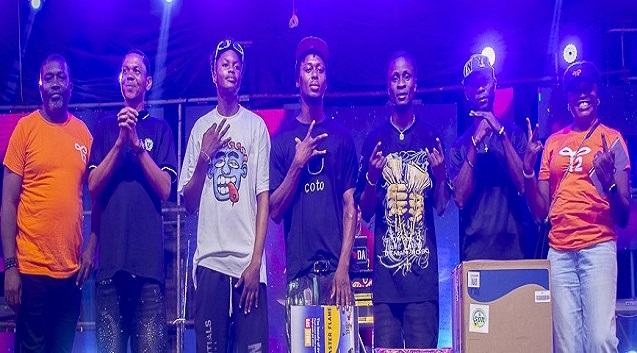Broadcasting
Heineken Named Beer of the Decade

Heineken, world’s premium beer brand, has won a Medal of Gold as Outstanding Premium Lager Brand of the Decade. This decoration is courtesy respected Nigerian business magazine Marketing Edge.

L-R: Aboyowa Ikpobe, Brand Manager, Heineken Lager Beer, Nigerian Breweries Plc; Dr. Ayo Teriba, MD/CEO, Economics Associate; Wasiu Abiola, Head Media, PR, Digital & Sponsorship, Nigerian Breweries Plc, at The Marketing Edge Awards Presentation For Heineken as Lager Brand of the Decade in Lagos last weekend
Heineken is the only Nigerian beer brand so honoured, during an elite event in Lagos on Friday, August 27, 2021.
John Ajayi, publisher, Marketing Edge, said, the award is ‘‘in recognition of the brand’s cumulative strategic initiatives over the years, alongside its unmatched consumer trend forecasting in the country.’’
The bulk of Heineken’s popularity stems from its unique blend of excellent ingredients that impart a distinct flavor, providing beer drinkers across the country with a premium experience. Beyond the sensory pleasure it delivers; it extends its impact on consumers’ lives through its groundbreaking initiatives.
Heineken asserts a claim to superiority, as evidenced by its campaigns in the last decade, from dominating the lifestyle sector by rebranding the annual Lagos Fashion Week.
The fashion exhibition founded by Omoyemi Akerele showcases the best creatives in Nigeria’s fashion industry and has served as a conduit between local creators and international fashion brands, breathing life into their creative processes through mentoring and masterclasses. One of such initiatives has plunged Heineken into a household name in the fashion world.
The worldwide beer brand didn’t stop at the Lagos Fashion Week; it also signed a ten-year sponsorship deal with the Union of European Football Associations (UEFA).
As a matter of fact, the Heineken-UEFA relationship was birthed in 1994 and its presence in over 190 markets around the world, continues to imprint its impact on the football community.
Kindling the kindred spirit of football lovers in Nigeria, it launched the #NeverWatchingAlone campaign to encourage communal viewing of football matches. For the 2021 UEFA Champions League finals, it convened football lovers in Abuja, with special appearances from Nancy Isime, Uti Nwachukwu, and Samantha Walsh.
Likewise, its UEFA Champions League Trophy Tour, helps fans experience the trophy; touring over 35 cities across the world, including a recent tour to Lagos, Nigeria in April 2019.
Heineken’s topnotch business practices are not left out of its merit for the Beer of the Decade Award as guided by the Heineken Code of Business Conduct (Heicode), positioning it as an unrivaled consumer-focused brand, which at its core is driven by innovation, creativity, and connectivity.
Seeing Heineken initiatives are uniquely tailored to enrich consumers’ lifestyles and uplift values, Heineken’s partnership with the United Nations Industrial Development Organisation (UNIDO) is one of its sustainability initiatives focused on increased water conservation, clean energy production, and local material sourcing, to benefit the immediate community of its operations.
The campaign which commenced in 2015 in the Ibadan region of the Ogun-Oshun catchment area, has had a tremendous impact spanning thousands of homes, local businesses, and communities across the years.
The Heineken brand truly has a midas touch as it has become a symbol of excellence and community in all fields, including sports, fashion, entertainment, environmental sustainability and so much more.
Cheers to a decade of impact!
Broadcasting
DG NCC Tasks University Dons on Research Commercialization, IP Management to Build Global Competitive Ecosystems

Dr. John Asein, director-general, Nigerian Copyright Commission (NCC), has charged universities to leverage Intellectual Property (IP), innovation management and research commercialisation to build vibrant, sustainable and globally competitive ecosystems.

The DG stated this while delivering a paper on: ‘’Research Commercialisation, IP Policy and Innovation Management’’ at the Committee of Vice-Chancellors of Nigerian Universities (CVCNU) organised Business Clinic themed: Unlocking University-Driven Business Ecosystems: Innovation, Partnerships and Sustainable Enterprise Models in Abuja.
The programme was targeted at engaging Vice-Chancellors, principal officers and other key officers in Nigerian Universities in a practical dialogue on how to transit their institutions into thriving business ecosystems through innovation, enterprise development and strategic partnerships.
In his presentation, Dr. Asein, disclosed that Universities are now recognised as engines of national development and innovation hubs that must connect scholarship to business.
He noted that with over 300 Universities in Nigeria, there is need for structured pathways to turn ideas into commercial outcomes while attention should be focused on IP assets in our universities in order to harness them in a safe, sustainable and satisfactory manner.
The DG NCC speaking further on leveraging resources from the creativity locked up within the university system, harped on the need to harness the soft power of our youth as Nigeria’s most valuable natural resources are its people.
Drawing demography from Nigeria youthful population, he observed that over 70 percent of Nigerians who are under the age of 30 are mostly in the university system studying. These youths, he noted, shape cultures, technology and innovation through creativity and digital skills.
He tasked universities to become innovation factories where young people can explore ideas, protect their IP and grow startups by integrating innovation culture, entrepreneurship training and IP awareness into its learning environment.
He equally urged Universities to look beyond the sciences to commercialize traditional knowledge-based innovations and harness the potentials in the creative arts disciplines like music, visual arts, theatre arts and others for commercial outcomes.
Dr. Asein, recommended that universities as centres of learning, should take the lead in using the IP system for promoting education and learning, wealth creation, revenue generation and institutional development.
Underscoring the need for all universities to have an IP Policy, he noted that the Model developed by the Nigerian Copyright Commission in partnership with the CVCNU is a good starting point.
The Secretary-General, CVCNU, Prof. Andrew Haruna, presented the welcome address at the event while the Director, Technology Innovation and Commercialisation, NOTAP, Mrs. Adah H.N. Mokolo-Oladunke represented the Director-General, NOTAP at the event.
The 2025 CVCNU Business Clinic witnessed attendance from representatives of Public and Private Universities across the 36 States in Nigeria.
Broadcasting
US invests $115m in counter-drone tech for World Cup security


Drone
The US Department of Homeland Security (DHS) will invest $115 million in counter-drone technology to safeguard the 2026 FIFA World Cup and events marking America’s 250th independence anniversary, creating a dedicated office for rapid drone system deployment.
Homeland Security Secretary Kristi Noem described drones as “the new frontier of American air superiority,” stressing the need to counter threats from drug cartels using unmanned aircraft for smuggling and surveillance, alongside incidents like a 2025 NFL stadium drone flight and 2024 New Jersey sightings.
The funding supports 11 World Cup host cities expecting over one million visitors, building on FEMA’s $250 million grants to those states and addressing risks heightened by cartels’ advancing tech, including a reported FBI tracking plot in Mexico.
DHS has conducted over 1,500 counter-drone missions since 2018, with the new Program Executive Office accelerating acquisitions amid President Trump’s border security push.
Broadcasting
Youth Talent Takes Center Stage as T2 Ignites High-Octane Rap Battles @ Carnival Calabar

The energy at the Carnival Calabar Music Concert reached a new high as T2 introduced a first-ever rap battle platform, giving young Nigerians an electrifying stage to showcase their talent, creativity, and self-expression while competing for exciting prizes.

Held at the U.J. Esuene Stadium, the activation blended pulsating music, vibrant culture, and youthful energy into a dynamic celebration that kept thousands of carnival-goers fully engaged from start to finish.
Eight fearless contestants stepped into the spotlight, going bar for bar in an intense lyrical showdown. Rappers fused local languages, pidgin, and sharp punchlines, creatively weaving the T2 brand into their verses.
Anchored by the energetic hosting duo MC Double I and MC Princess, the rap battles thrilled over 16,000 attendees, including the Governor of Cross River State, Senator Bassey Otu, delivering an unforgettable showcase of youth talent and cultural expression.
With prizes including fridges, gas cookers, sound systems, and airtime top-ups, the competition remained fierce throughout the night. After two high-energy rounds narrowed the field to a five-man final duel, Emmanuel Eye emerged as the overall winner, taking home the grand prize — a fridge.
“I never expected this at all,” Emmanuel said. “I came to the concert like anyone else, and hearing about the T2 rap battle was a surprise. When I got the chance to perform, I just went for it. Being named the overall winner is amazing, and I’m grateful to T2 for creating this platform to showcase our talent.”
Beyond the stage performances, T2’s presence added a digital layer to the carnival experience. As part of its role as Digital Technology Partner of Carnival Calabar, the brand introduced the MyT2 App as a lifestyle companion, while also enabling line reactivations, airtime top-ups, and instant rewards for hundreds of attendees, blending technology seamlessly into the live celebration.
Commenting on the activation, Chinelo Manefo, Specialist, Events and Sponsorship at T2, said:
“The energy from both the rappers and the crowd was incredible. This platform reflects exactly what T2 aims to create — a celebration of youth, creativity, and culture, enhanced by technology that connects people and experiences. Seeing the audience so immersed shows how music and performance can empower the next generation.”
The Carnival Calabar Music Concert, headlined by Tiwa Savage, Timaya, and top local performers, was further energized by T2’s interactive rap battle platform. By blending music, culture, youth expression, and digital innovation, T2 reinforced its commitment to championing Nigeria’s next generation, giving young creatives a stage to shine while enriching how they experience the festival.

 E-Financial2 days ago
E-Financial2 days agoZenith Bank Gets Regulatory Approval for Full Takeover of Paramount Bank

 Telecom2 days ago
Telecom2 days agoMTN Nigeria Suffers 9,218 Fibre Cuts in 2025 as Vandalism, Theft Cripple Network

 E-Business2 days ago
E-Business2 days agoFirm Detected a Fivefold Surge in QR Code Phishing Attacks in the Second Half of 2025

 Telecom2 days ago
Telecom2 days agoNew Investment Fund Targets Acceleration of Emerging Technology in Nigeria

 News2 days ago
News2 days agoNITDA Commits to Digital Inclusion for Persons with Disabilities

 Telecom2 days ago
Telecom2 days agoNCC Licences Six New ISPs to Challenge Telcos, Satellite Giants

 E-Financial2 days ago
E-Financial2 days agoFCCPC Delists Non-Compliant Digital Lenders Post-January 5 Deadline

 E-Business2 days ago
E-Business2 days agoJustMarkets Unveils Top 5 Trading Assets for 2026 Profits



























